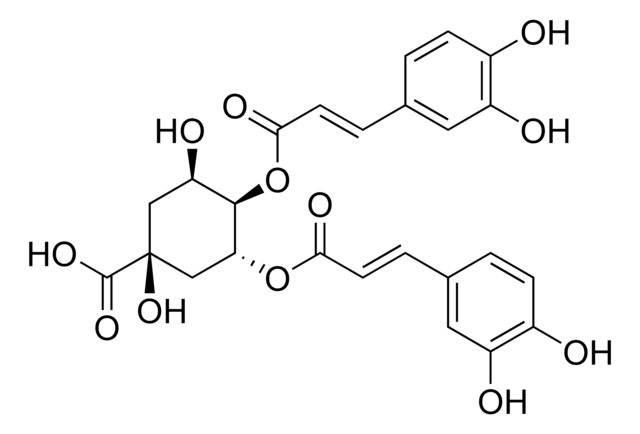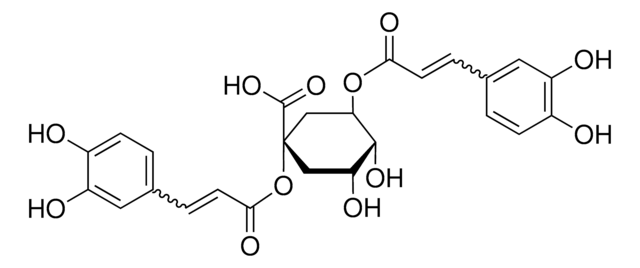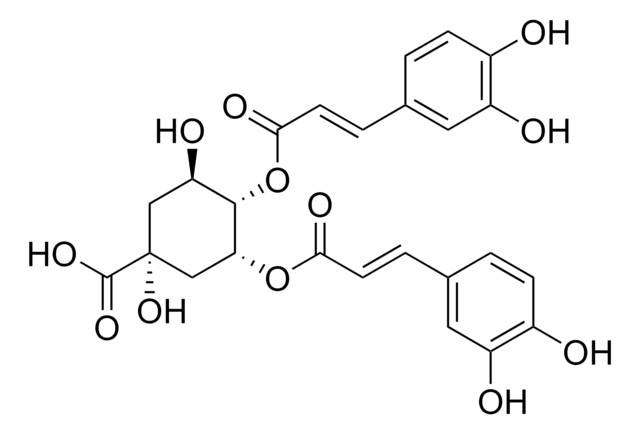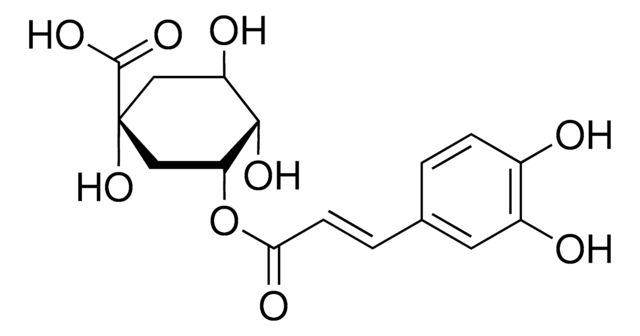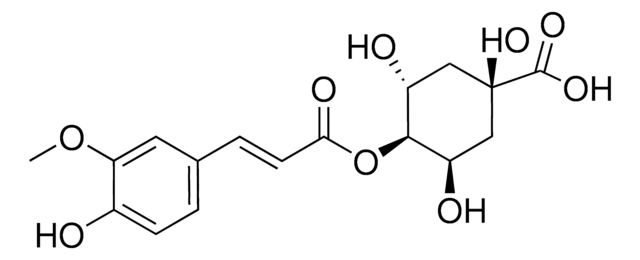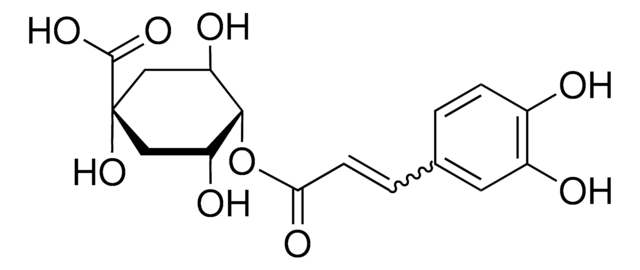PHL80425
3,4-Dicaffeoylquinic acid
phyproof® Reference Substance
Synonym(s):
4,5-Di-O-caffeoylquinic acid, 4,5-Dicaffeoylquinic acid (CAS), Isochlorogenic acid C
About This Item
Recommended Products
grade
primary reference standard
product line
phyproof® Reference Substance
Assay
≥95.0% (HPLC)
form
solid
manufacturer/tradename
PhytoLab
storage temp.
2-8°C
SMILES string
O[C@@H]1C[C@@](O)(C[C@@H](OC(=O)\C=C\c2ccc(O)c(O)c2)[C@H]1OC(=O)\C=C\c3ccc(O)c(O)c3)C(O)=O
InChI
1S/C25H24O12/c26-15-5-1-13(9-17(15)28)3-7-21(31)36-20-12-25(35,24(33)34)11-19(30)23(20)37-22(32)8-4-14-2-6-16(27)18(29)10-14/h1-10,19-20,23,26-30,35H,11-12H2,(H,33,34)/b7-3+,8-4+/t19-,20-,23+,25-/m1/s1
InChI key
UFCLZKMFXSILNL-RVXRWRFUSA-N
Looking for similar products? Visit Product Comparison Guide
Related Categories
General description
Application
- Neuroprotection in Parkinson′s Disease: Research on 3,4-Dicaffeoylquinic acid from Calendula officinalis highlights its potential neuroprotective effects through modulation of the PI3K and ERK signaling pathways, suggesting its application in Parkinson′s disease management (Zhang et al., 2024).
- Antioxidant and Anti-inflammatory Activities: Studies on the antioxidant and anti-inflammatory properties of 3,4-Dicaffeoylquinic acid in Merremia umbellata extract suggest its therapeutic potential in treating inflammatory conditions, making it a valuable component in natural phenolic compound research (Lee et al., 2023).
- Hypoglycemic Effects on Type 2 Diabetes: 3,4-Dicaffeoylquinic acid has been studied for its hypoglycemic effects via network pharmacology and transcriptomics, showing promise in type 2 diabetes treatment. This research underscores its importance in biochemistry and pharmacological innovations (He et al., 2024).
- Screening Natural Antioxidants: The compound′s effectiveness in screening and evaluating natural antioxidants demonstrates its utility in developing analytical standards for identifying potent bioactive compounds in various botanical parts (Yang et al., 2024).
- Molecular Docking for Drug Development: 3,4-Dicaffeoylquinic acid is used in molecular docking studies to identify interactions with PPARγ, aiding in the discovery of potential drug candidates from natural sources. This application is crucial for advancing drug discovery in biochemistry and pharmaceutical sectors (Elkhattabi et al., 2023).
Other Notes
Legal Information
Storage Class Code
11 - Combustible Solids
WGK
WGK 3
Flash Point(F)
Not applicable
Flash Point(C)
Not applicable
Regulatory Listings
Regulatory Listings are mainly provided for chemical products. Only limited information can be provided here for non-chemical products. No entry means none of the components are listed. It is the user’s obligation to ensure the safe and legal use of the product.
JAN Code
PHL80425-10MG:
Choose from one of the most recent versions:
Certificates of Analysis (COA)
Don't see the Right Version?
If you require a particular version, you can look up a specific certificate by the Lot or Batch number.
Already Own This Product?
Find documentation for the products that you have recently purchased in the Document Library.
Our team of scientists has experience in all areas of research including Life Science, Material Science, Chemical Synthesis, Chromatography, Analytical and many others.
Contact Technical Service
